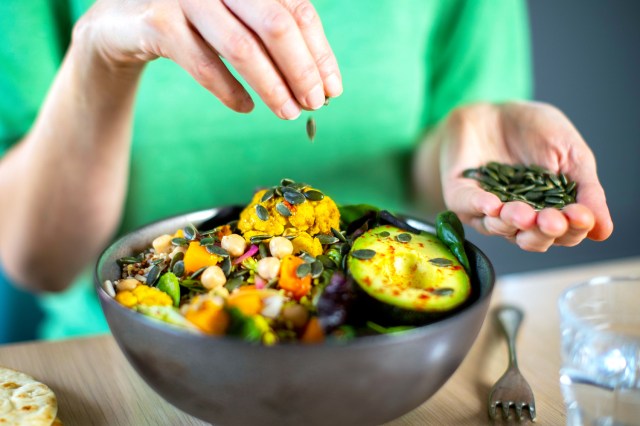No matter how active you are (or aren't), you’ve likely heard about the importance of protein. Fitness coaches, experts, and maybe even your doctor toss this word around like it’s the holy grail of health goals. But why is protein intake so important? And is it still important to track if you don't routinely go to the gym?
Protein is a necessary nutrient that all bodies need to perform their best. The reason it comes up so much in regard to fitness routines is because increasing your protein intake is necessary to help restore, rebuild, and repair muscle damage that occurs when working out. According to the National Center for Biotechnology Information (NCBI), “proteins catalyze virtually all chemical reactions in the body, regulate gene expression, comprise the major structural elements of all cells, regulate the immune system, and form the major constituents of muscle.” Essentially, every bodily function that occurs needs some amount of protein in order to work properly. So, how much protein do you need to be at your best? Here’s what experts have to say.

How Much Protein Do Women Need Every Day?
As is the case for most medical questions, the answer of how much protein you need depends on each individual. However, there are some broad-strokes requirements and formulas that doctors generally go by. Be sure to speak to your personal physician to see if you need more or less protein than the average person.
“The recommended dietary allowance (RDA) for protein for the average adult woman is about 46 grams per day,” celebrity personal trainer Kollins Ezekh explains. “Similar to men, this amount can vary based on factors like age, activity level, and health status. Women who are physically active or aiming to build muscle might need more, typically around 1.2 to 2 grams of protein per kilogram of body weight.”
Multispecialist physician Dr. Azza Halim adds that women who are pregnant or breastfeeding “need to increase their protein to about 71 grams per day.”

How Much Protein Do Men Need?
The amount of protein needed for men is only a bit higher than for women. According to Ezekh, “the RDA for protein for the average adult man is about 56 grams per day. However, this can vary based on factors such as age, activity level, and overall health.” And of course, “for men who are physically active or looking to build muscle, protein needs may be higher, often ranging from 1.2 to 2.2 grams of protein per kilogram of body weight.”
Again, speak with your physician to discuss your protein needs before beginning a new regimen, as there’s no one-size-fits-all amount people should aim for.

Do Vegans Need More Protein?
According to Dr. Halim, it’s not that vegans necessarily need more protein than meat eaters; rather, it’s that they need to ensure they’re keeping up with their protein intake since they’re not eating meat (a high-protein food source). “Many vegans don’t get enough plant-based protein; therefore, a variety of
protein sources [is] needed,” Dr. Halim says. “Plant proteins can lack essential amino acids; good sources [with amino acids] include beans, lentils, tofu, tempeh, quinoa, nuts, seeds, and grains.”
If you’re not vegan, other foods that both Dr. Halim and Ezekh recommend for more protein include chicken, turkey, lean cuts of beef, pork, salmon, tuna, shrimp, and eggs, as well as Greek yogurt, cottage cheese, milk, cheese, and chickpeas. You can also pick up plant-based protein powders that are made from peas, rice, hemp, or soy, to up your daily intake.
Again, protein needs will vary from person to person and will even change at different times of your life. “Factors such as age, activity level, muscle mass, and overall health play significant roles in determining the right amount of protein,” Ezekh explains. “Additionally, distributing protein intake evenly throughout the day can be beneficial for muscle protein synthesis and overall health. For anyone looking to adjust their protein intake, consulting with a nutritionist or health care provider can provide personalized guidance.”
This article is for general informational purposes only.
Affiliate Disclaimer Medical Disclaimer












 Unique Beauty is free for all users.
Unique Beauty is free for all users.